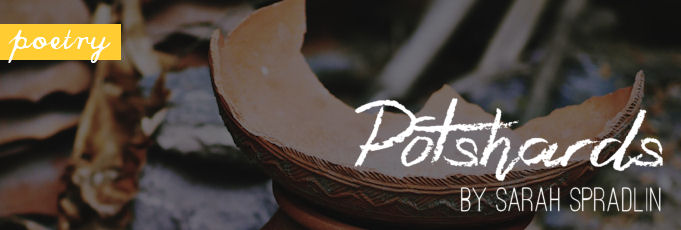When I was younger,
I collected potshard stories
about a place where grown-ups lived.
I wondered about it on summer days—
feet had grass-tickled toes and mud-caked heels,
fingers were perches for butterfly kisses,
ears were homes for the angels’ laughter,
eyes were puddles for shooting stars to land,
lips were promises of bedtime stories and adventure.
People in those places,
pinecone textbooks told me,
had a kind of fluorescent-kissed skin.
They stayed in these
forests of cookie-cutter cubes and cork board canopies
held up by aching metal arms and cold, stilt-like trunks.
Maybe I’ll never grow up;
grown-ups always find what they aren’t searching for,
tucked away in their offices,
happily perpetual acquaintances
used for good mornings and good evenings and good weekends,
then tossed away,
tempered by the cold,
fragile like their hands,
with fingers like spit-shined soldiers clicking across keyboards,
always carefully watched after.
If I never grow up, then perhaps I’ll never find it—
I’ll never wander onto haggard, threadbare gray carpets
in shoes that feel like balloons,
chain myself to a world governed by ticking clocks,
buzzing, humming, whispering machines that steal away the smell of rain;
I can hear myself breathing.
I am afraid;
what if I forget what sunrises feel like
and warmth that floods like late-August storms—
that clears the sleep from my eyes?
That friendship isn’t about holding a cardboard of highlights
as much as it is cleaning off the cobwebs around doors
and exchanging stories with something beautifully old-school,
mumbling in the backdrop of days that leave you tired—
dirty, aching, full of so much life.
Could I forget drawing lines in my palms,
covered in God-knows-what from God-knows-where,
hidden under a noonday sun and azure sky
that have washed away worries with simpler things
like earth beneath nails.
I pray it never washes away—
that I never forget what it feels like
to push past my breaking point
and live,
leaning into the seat of a pickup truck that makes me feel
ten feet taller and smile five feet wider.
Work smells like home,
and you smell filthy,
but all I can taste is victory and dust
kicked up by tires that have tread many miles on unpaved roads
and untilled soil.
I am afraid I might forget how much I need these simple moments—
these lessons I don’t deserve,
but someday I hope I might
claim this land like it claimed me;
my heart is overflowing,
so I’m drawing my line in the sand
with potshards from a place where grown-ups go
and I have visited,
in hands that extend brotherhood, callouses, and push-pin grease.
The dust and grime of the field has flown north,
made its home where it has landed
on my skin, I find new islands in the uncharted waters
of arms always reaching (often trembling),
only now arriving to this conclusion:
one day I plan to lose myself
in a forest that never stops reaching for its creator
with gnarled fingers that hold up the sky by day,
but let darkness fall by night
and follow the path of stars instead,
veiled elsewhere by spotlights that never reach them.
A forest never stops growing, giving;
it forgives the rain for its faithlessness,
and man for his forgetfulness.
It has a ceiling that leaks;
it isn’t safe,
but it smells suspiciously like home.
These potshard stories have their cracks,
and as I clamber through them,
I know I love this place
where the artist-in-residence created the universe
and mud pies.



Oh, my. This is… how shall I put it? Authenticity + an approach of awe = awesomeness.
Awww! Thanks, Daeus! I’m so glad you liked it!! 😀
Ah! Sarah, I’ve been eagerly awaiting this poem’s arrival since you told me about it, and it did not disappoint! I really love this. It makes my mind imagine the smell of freshly cut grass and the rainfall on a dirt road, seriously, this is wonderful. Great work friend!
😀 😀 😀 Thanks so much, fam! <3 I'm super glad you liked it!
Oh. Goodness. I… wow, I don’t even know what to say. 😛 This is so… so TRUE. Every word-picture was lovely, yes, but the truth of it all is what really got me, especially because it was so much a perfect reflection of the way I feel about life… thanks Sarah. This is precious.
Awww! Thank you, Kate!!! 😀 I’m so excited that you think it’s true. It was so hard to capture all of that. xD I was like “THERE IS SO MUCH FEEL; HOW CAN I POEM ABOUT THIS?!”. 😉
I almost cried while reading this…and that’s saying something because I rarely cry. This is so beautiful and profound, Sarah. Wonderful work. 🙂
*hides behind door grinning in victory over almost making someone cry* I feel like that’s only socially acceptable for authors. xD Thank you so much, though, Ingrid! I’m so glad you liked it! <3 😀
Wow Sarah! That was beautiful…I smiled the whole way through:) Your words flow so wonderfully! Amazing job!! I can’t wait to see more of your work;)
Thank you, Becky!!! 😀 Hope to see some of your work published here on KP in the future! 😉
I cried. *am at a loss for words* 🙂 *goes back to read it again*
Awwww! Thank you, Sarah! I am so glad you liked it! 😉 (Sorry (kinda) that I made you cry. xD ;P)
Oh. My. Word. @spradlin THIS IS INCREDIBLE! There’s just so much FEELING in your writing; it’s so beautiful. I always love reading your writing, Sarah, and this poem is so touching and amazing. Keep writing for HIM!
Awwww! Thank you, Greta! 😀 😀 😀 Your comment made my heart happy. 😉
Oh WOW! This is beautiful!
Aww! Thank you, Bethany! 🙂
I laughed, felt moisture in my eyes, and then I laughed again. Simply because I grew up in the north west in a place where trees tried to hold up the sky and gravel roads were as common as paved ones, where the rain came more often than the sun and every scar has a story deeper than its marring touch. Your work makes me wonder if I should give some of my poetry to the Kingdom Pen and see if I can add to the community even an inch of what you have.
ABSOLUTELY! DO IT. SHARE YOUR WORDS AND YOUR POETRY! *AGGRESSIVELY HAGGLES FOR YOUR SUBMISSION* ALWAYS DO THE POETRY THINGS!!! Also, thank you so much. It’s awesome to know there’s someone else who feels that feel–and that’s what poetry is all about, I think. 🙂 Sharing emotions.
@spradlin This is INCREDIBLE!!! Seriously, I want to write poetry like this!
*confetti everywhere*
Awwwww. Thank you so much, friend! I am so glad you liked it! 😀
@spradlin Thank you so much for this. I just discovered it and I’m so sad I missed it before! It perfectly expresses some of the hardest thoughts to express. Again, thanks and I can’t wait to read more of your poetry!
Awwww! 🙂 I’m so glad that you liked it!!!